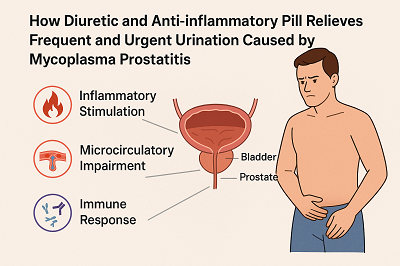How Diuretic and Anti-inflammatory Pill Relieves Frequent and Urgent Urination Caused by Mycoplasma Prostatitis
Mycoplasma prostatitis is a relatively common condition in the male genitourinary system, with Ureaplasma urealyticum and Mycoplasma hominis being the primary pathogens. This infection often causes classic urinary symptoms such as frequency, urgency, and painful urination, significantly impacting daily life. Conventional Western treatments usually involve antibiotics, but due to increasing drug resistance and high recurrence rates, results can be frustrating.

Fortunately, the traditional Chinese medicine formula Diuretic and Anti-inflammatory Pill offers a new therapeutic approach. Developed by Dr. Lee Xiaoping after decades of clinical practice, this patented remedy (Patent No. ZL200910157894) combines classical TCM theory with modern pharmacological principles to provide multi-target relief for inflammatory conditions like mycoplasma prostatitis.
Understanding the Link Between Mycoplasma Prostatitis and Urinary Symptoms
The connection between mycoplasma prostatitis and urinary frequency/urgency is complex and multifactorial. It typically stems from three main mechanisms: inflammatory irritation, microcirculatory disturbances, and immune-mediated damage. Understanding these mechanisms can help tailor more effective treatment strategies.
1. Inflammatory Stimulation
When mycoplasma infects the prostate, both the pathogens and their metabolic byproducts irritate the prostate tissue and surrounding nerves, triggering inflammation. The prostate becomes congested and swollen, compressing the urethra and impairing the function of the bladder neck and sphincters.
From an anatomical standpoint, the prostate surrounds the urethra. Inflammation-induced swelling disrupts urine flow. Meanwhile, inflammatory mediators like prostaglandins and interleukins lower the bladder’s storage threshold, triggering urgency and frequent urination even with minimal urine. The detrusor muscle becomes overly sensitive, exacerbating urgency and potentially leading to incontinence.
2. Microcirculatory Impairment
Infection-induced inflammation causes prostate blood vessels to spasm and increases blood viscosity, leading to microcirculation disruption. Oxygen and nutrients can’t reach the tissue efficiently, and waste removal slows, resulting in ischemia and impaired prostate function.
These effects extend to the bladder as well. Poor circulation reduces detrusor muscle strength, leading to incomplete emptying and residual urine, which continuously irritates the bladder lining, resulting in persistent frequency and urgency.
3. Immune Response
The body's immune system activates to fight the infection, but in the process, it may mistakenly attack healthy prostate tissue, worsening inflammation. This prolonged immune response leads to edema and urethral compression, increasing bladder pressure and disrupting normal urination. The resulting functional strain on the bladder intensifies symptoms.
Additionally, immune complexes formed by antibodies and mycoplasma antigens can deposit in prostate and urethral tissues, triggering autoimmune inflammation and further aggravating urinary symptoms.
How Diuretic and Anti-inflammatory Pill Addresses the Symptoms
Diuretic and Anti-inflammatory Pill uses a synergistic blend of over 50 herbal ingredients including Plantago seed, Houttuynia cordata, Polygoni avicularis, Dianthus, Talcum, Scutellaria baicalensis, Angelica sinensis, Carthamus, Peony, Peach kernel, Aucklandia, and Vaccaria. These herbs work in concert to target multiple aspects of mycoplasma prostatitis and its urinary complications.
1. Inhibiting Mycoplasma Growth and Reducing Inflammation
Herbs like Honeysuckle and Houttuynia contain compounds that interfere with mycoplasma metabolism and protein synthesis. For instance, honeysuckle inhibits protein production, while houttuynin disrupts mycoplasma cell membranes.
As the bacterial load decreases, the source of inflammation subsides, allowing the prostate to recover. Urinary tract sensitivity lessens, and symptoms like frequency and urgency begin to resolve. Additionally, these herbs suppress inflammatory cytokines, protecting surrounding tissues.
2. Improving Local Circulation and Repairing Tissue
Ingredients such as Safflower, Peach kernel, and Aucklandia enhance blood flow by dilating blood vessels and improving viscosity. Better circulation increases oxygen and nutrient delivery to the prostate, accelerating tissue repair and regeneration.
Efficient circulation also aids in the removal of inflammatory byproducts and excess fluid, reducing swelling and pressure on the urethra. As prostate tissue heals, bladder function improves, and urinary symptoms are significantly alleviated.
3. Alleviating Bladder Irritation
Plantago seed, Dianthus, and Polygoni avicularis have diuretic properties that promote urination, helping flush pathogens and inflammatory secretions from the bladder and urethra. This reduces mucosal irritation and restores a healthy urinary environment.
These herbs also help regulate the detrusor and sphincter muscles, improving bladder control and reducing urgency.
4. Combating Fibrosis and Hyperplasia
Chronic infection can lead to structural changes in the prostate, such as fibrosis and calcification. Herbs like Vaccaria and Peach kernel, combined with detoxifying agents like Viola and Honeysuckle, help break down abnormal collagen deposits and prevent new fibrous tissue from forming. This relieves anatomical pressure on the urethra, restoring smoother urine flow and alleviating symptoms at their root.
5. Enhancing Immunity and Holistic Regulation
Unlike Western approaches that focus solely on targeting pathogens, Diuretic and Anti-inflammatory Pill follows TCM principles of holistic balance. Certain ingredients help modulate immune function, enhancing the body's natural defenses against recurring infections and promoting long-term recovery.
Case Study: From Discomfort to Recovery
John M., a 32-year-old engineer from Texas, suffered from chronic urinary frequency and urgency due to mycoplasma prostatitis. He had to wake up 4–5 times each night, severely affecting his sleep and work performance. Despite multiple courses of antibiotics, his symptoms persisted.
Eventually, he turned to Diuretic and Anti-inflammatory Pill. After just one treatment cycle, he noticed reduced nighttime urination. By the third cycle, his symptoms had nearly disappeared, and lab tests confirmed that the mycoplasma infection had cleared. After completing five cycles, his prostate returned to normal function, and he reported regaining his health and confidence. More Testimonials Here: https://www.diureticspill.com/Testimonials/
Final Thoughts
Urinary disorders caused by mycoplasma prostatitis are the result of chronic infection and impaired tissue repair. Diuretic and Anti-inflammatory Pill offers a comprehensive treatment approach, tackling both the symptoms and underlying pathology through multi-component synergy—antibacterial, anti-inflammatory, circulatory, and immune regulation.
However, patients should always use this treatment under the guidance of a qualified physician to ensure both safety and effectiveness.



